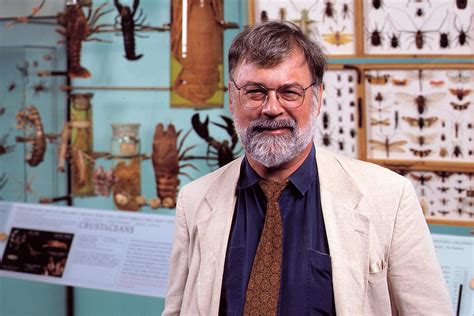A Quote by Lewis Thomas
I am a member of a fragile species, still new to the earth, the youngest creatures of any scale, here only a few moments as evolutionary time is measured, a juvenile species, a child of a species. We are only tentatively set in place, error prone, at risk of fumbling, in real danger at the moment of leaving behind only a thin layer of of our fossils, radioactive at that.
Related Quotes
There are millions of different species of animals and plants on earth--possibly as many as forty million. But somewhere between five and fifty BILLION species have existed at one time or another. Thus, only about one in a thousand species is still alive--a truly lousy survival record: 99.9 percent failure!
An Individual, whatever species it might be, is nothing in the Universe. A hundred, a thousand individuals are still nothing. The species are the only creatures of Nature, perpetual creatures, as old and as permanent as it. In order to judge it better, we no longer consider the species as a collection or as a series of similar individuals, but as a whole independent of number, independent of time, a whole always living, always the same, a whole which has been counted as one in the works of creation, and which, as a consequence, makes only a unity in Nature.
As evolutionary time is measured, we have only just turned up and have hardly had time to catch breath, still marveling at our thumbs, still learning to use the brand-new gift of language. Being so young, we can be excused all sorts of folly and can permit ourselves the hope that someday, as a species, we will begin to grow up.
And at this moment in history, our core value happens to be the raw, aching truth of the human predicament. It may also be the only belief that can save us as a species. A species that will continue to find comfort and delight in the companionship of animals, the miracle of birds, the colours of the corals and the majesty of the forests. We are in it together, on this blue spinning marble in the cold and silent void. And we must act on that belief, if we are going to be able to continue to live a good life here, in this beautiful and fragile country, on this lovely planet, our only home.
Paleontologists ever since Darwin have been searching (largely in vain) for the sequences of insensibly graded series of fossils that would stand as examples of the sort of wholesale transformation of species that Darwin envisioned as the natural product of the evolutionary process. Few saw any reason to demur - though it is a startling fact that ...most species remain recognizably themselves, virtually unchanged throughout their occurrence in geological sediments of various ages.
A species has to become pretty intellectually advanced in order to grasp the concept of death in the abstract, and to dream up the idea of immortality. Long before that (in evolutionary terms) all species with brains have the survival instinct in some form. So, I am just saying that there are many existent proofs of species that have one, but not the other.
In 1966 Rolf Edberg wrote "This is mankind's home", "in the narrow borderland between the deathly heat beneath our feet and the coldness of space above us". He describes the fragility of our existence in poetic terms: "the atmospheric layer is so thin that it cannot be represented on any globe with even the finest brushstroke. At its thickest, it is only a few fractions of a millionth of the Earth's radius. This thin layer is what makes the difference between our planet and the sterile landscape of the moon." After reading that, one does feel the need to take better care of this fragile layer.
Researchers keep identifying new species, but they have no idea about the life cycle of a given species or its other hosts. They cut open an animal and find a new species. Where did it come from? What effect does it have on its host? What is its next host? They don't know and they don't have time to find out, because there are too many other species waiting to be discovered and described.
When I am at a dinner table, I love to ask everybody, 'How long do you think our species might last?' I've read that the average age of a species, of any species, is about two million years. Is it possible we can have an average life span as a species? And do you picture us two million years more or a million and a half years, or 5,000?
Zoologists have reckoned there are up to at least 750 species of animal that have been observed exhibiting same-sex behaviour, or gender role transformation (which is very common in a wide range of fauna). There is only one species on earth, however, which has exhibited homophobia or transphobia. And that is the species homo sapiens sapiens. Us. So let's not allow the foolish, ignorant or bigoted ever to use words like "natural."
Our species is the only creative species, and it has only one creative instrument, the individual mind and spirit of man. Nothing was ever created by two men. There are no good collaborations, whether in music, in art, in poetry, in mathematics, in philosophy. Once the miracle of creation has taken place, the group can build and extend it, but the group never invents anything. The preciousness lies in the lonely mind of a man.




































